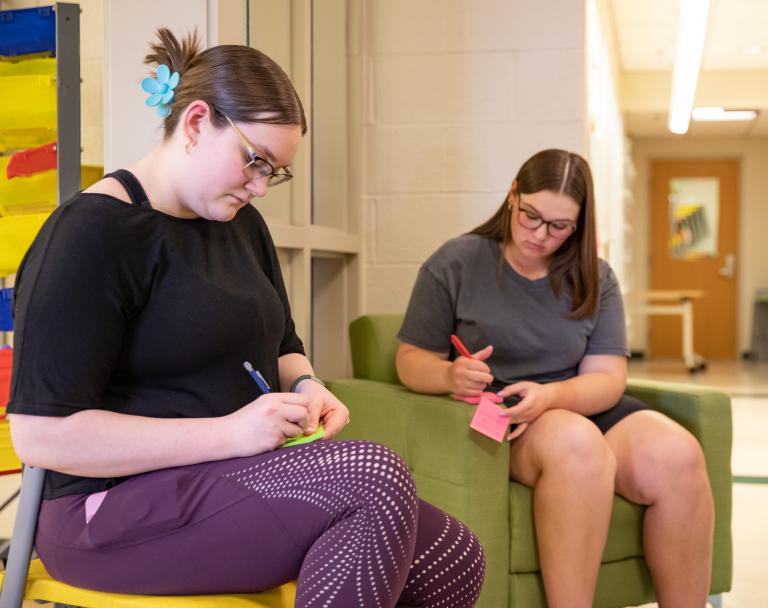Students Reflect Diversity of Professional Writing
Whether for penning a novel, working as an editor or practicing public relations, a Professional Writing degree from York College of Pennsylvania goes a long way.
Jalil Dixon ’23 knew his homework assignment was late, but he didn’t care. Jalil had crafted a world. He wrote about the main character, his aspirations to become a professional wrestler, and the bully who ran the school.
The assignment required students to write a one-page story. By the time he had finished, Jalil had written four pages. Not bad for a fourth-grader.
“I had fun engulfing myself in the details,” says Jalil, a Professional Writing major at York College of Pennsylvania. “Writing is creating something in the universe that’s mine that people can enjoy. I love bringing these cool thoughts I have and creating a world.”
‘The Center of Everything’
For Kameron Cherry ’22, writing wasn’t about building worlds and creating novels. Growing up with a speech impediment meant that writing was necessary for communication.
“It was hard to talk, and that lasted with me through high school,” Kameron says. “But when I wrote, it was easier to communicate with others.”
He fell in love with writing and wanted to become a screenwriter. A valuable lesson from a professor changed his trajectory.
“Dr. (Gabriel) Cutrufello once said, ‘Writing is the center of everything, regardless of subject,’” Kameron recalls. “His passion for writing shaped my mind and opened me to a new career.”
Insight into Real Life
Jalil and Kameron have different goals when it comes to writing professionally. Jalil wants to become an editor, while Kameron hopes to work in public relations.
Their love for writing intersected when they were interns with Young Scholars in Writing. The annual journal, with its third edition in the works, publishes research articles by undergraduates on topics related to rhetoric and writing. The program receives funding through a grant from the College’s Center for Academic Innovation and the Naylor Endowment in Writing Studies.
The pair were editorial interns on the journal in fall 2021. Their responsibilities included social media writing and management and assisting with editorial duties.
“The internship gave me valuable insight to real-life experiences,” Jalil says. “This work has more substance to it. We were on equal footing with the professors.”
As an intern, Kameron learned to work as a member of a team. Early on, he tackled an assignment but didn’t understand the directions. Instead of asking for help, he kept it to himself.
“I got called out because I needed to communicate better and it affected the team,” Kameron says. “After that, I learned to communicate better, even if I felt I could be annoying. I wanted to not only better myself, but to better the organization.”
The Pen is Mightier
York College released its most recent edition of Young Scholars in Writing in February. It features articles on pursuing evolution and revolution through form, being an essential worker, and examining neoliberalism. The topics helped Kameron gain an appreciation for editing.
“The editing process is not, ‘Can they say that?’” Kameron says. “It’s about, ‘How can we make it where people will listen in an efficient way?’”
Jalil says the program and his Creative Writing course motivated him to write even more.
“Professors helped me come up with new ways to think of subjects and ideas,” Jalil says. “The program helped show me different avenues for the professional writing industry.”
Kameron and Jalil believe that Young Scholars in Writing provides a chance for students to exemplify the saying, “The pen is mightier than the sword.” The publication has engaged dozens of students through the editorial process, and even serves as a platform for undergraduate research projects.
“A lot of history has writing as a catalyst of it,” Kameron says. “Abraham Lincoln, Frederick Douglass, they all used writing to create an impact. Editing this journal made me feel like I’m doing something for my peers and for the world.”




